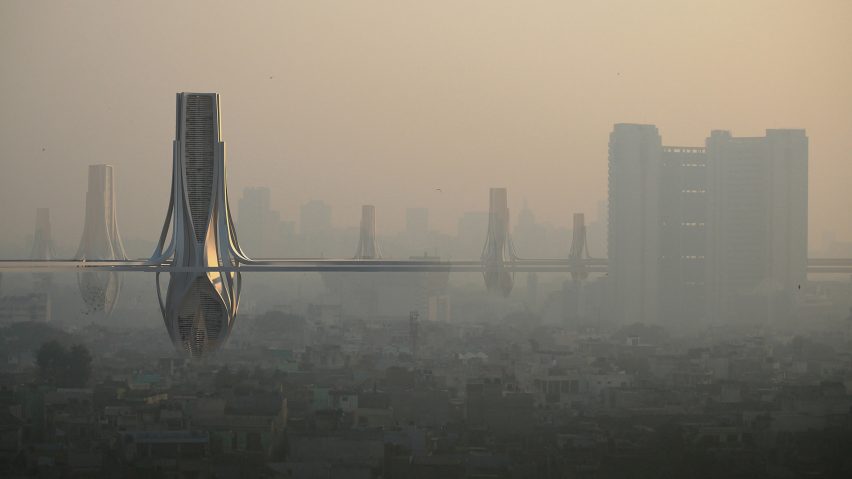Dubai-based architecture studio Znera has developed a concept for a network of 100-metre high towers that would absorb smog and clean Delhi's choking air.
Called The Smog Project, the proposal envisions a grid of towers that could absorb pollution from the atmosphere, with each building creating a 1.2 mile radius of semi-clean air.
Delhi is the most polluted city in the world, according to the World Health Organisation. Industrial waste, diesel vehicles, power plants in the city, and crop burning in the neighbouring Haryana and Punjab regions, all contribute to poor air quality.
When nitrogen oxides and volatile organic compounds, released by these activities, react with sunlight it creates smog – making the air dangerous to breathe. Levels of carcinogenic pollutants in Delhi are currently ten times higher than those in Beijing.
In Znera's proposal filtration pods at the base of each tower would capture pollutants at the level where people breathe, and propellers at the top would circulate the cleaned air.
Each tower, Znera claims, would produce 3.2 million cubic metres of clean air each day, to reduce pollution to moderate levels.
Bridges would connect the vertical air purifiers, which would be arranged in a hexagonal shape and placed at key points in the city.
Hydrogen fuel cells located in the bridges would be used to power the smog-sucking towers, along with solar panels.
Carbon particles captured and collected in the filters could then be used, according to the architects, to create concrete, graphene, or even ink.
Indian startup company Graviky Labs has created a method that transforms carbon from air pollution into a product called Air Ink.
The Smog Project has been shortlisted for the Experimental Future Project of the Year award 2018 at the World Architecture Festival.
Dutch designer Daan Roosegaarde has been working on his Smog Free Tower project for several years. These seven-metre-high towers with patented air purifying technology suck in smog at the top then release clean air through vents in the building's six sides.
Since self-funding with a Kickstarter campaign in 2015, he has installed towers in India, Columbia, Mexico, Poland and the Netherlands. Roosegaarde has called for designers to move away from designing luxury items and tackle global problems such as pollution instead.

